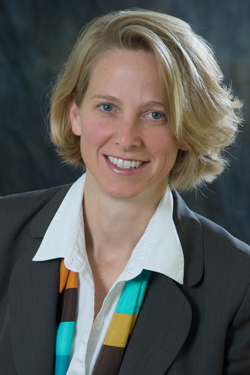Women living in poverty are bringing their voices to the discussion of food insecurity in the United States

Dr. Mariana Chilton, the featured speaker
for the third annual symposium, “Healthy
Eating in Context,” shared her research
and outreach programs that are bringing
attention to food insecurity in the
United States.
May 6, 2013
“Hunger in the United States is a major public health problem, a silent public health problem.”
And the size of the problem in the United States is more prevalent than many people know and also comes with serious health, social economic consequences, said Dr. Mariana Chilton of Drexel University, the featured guest speaker for the third annual symposium, “Healthy Eating in Context: Bridging Gaps, Linking Communities.”
The Center for Research on Nutrition and Health Disparities at the Arnold School of Public Health, in partnership with USC’s Environment and Sustainability Program, brought the dynamic leader of the Center for Hunger-Free Communities to the University of South Carolina, where she delivered a sobering account of hunger in the United States and showcased a program, “Witnesses to Hunger,” that is spreading the message of food insecurity to community, state and national leaders and policymakers.
Statistics from the U.S. Department of Agriculture show that the best way to be food insecure is to be a young child: 22.3 percent of U.S. children under age six live in a food-insecure households, compared to 11.3 percent of adult-only households.
In a 2010 report, the Feeding America/Second Harvest emergency food network found that providing annual hunger relief services to 37 million Americans, including 14 million children, represented a 46 percent increase over 2006.
Chilton said she brought her studies in epidemiology, anthropology and folklore to address child hunger in America through outreach and research. The result has been the linking of the scientific community and community members – including those who usually have no voice, women living in poverty.
Mothers and caregivers of children were given digital cameras to photograph aspects of their lives that showcased food insecurity in their lives. The result from the Photovoice project that began in Philadelphia in 2006 yielded 10,000 photographs and many comments. “We asked them ‘why did you take this picture? What do you want people to see? What do you want people to do?’ “ said Chilton of the program that has earned national recognition for its approach on letting the “real experts” tell their stories of poverty, despair and hope.
Women were vocal about their plight and that of their children. Among the comments: “… things get so bad that you are afraid to ask for help.’ “
The Photovoice project and focus groups formed the basis for Chilton’s program, “Witnesses to Hunger,” in which those who know about hunger firsthand are given the opportunity to talk about what it is like to raise a child on a limited income. The “witnesses” have spoken to local leaders, to legislators in Pennsylvania and also have given testimony to Congressional leaders. Chilton also was invited to the White House for a discussion of the movie, “A Place at the Table,” which aims to inspire a national movement to end hunger in the United States.
“It can’t be done one person at a time,” she said. “It needs to be symptomatic.”
The Center for Research on Nutrition and Health Disparities has grown to have a growing national reputation and an impact across the University, said Dr. Tom Chandler, dean of the Arnold School of Public Health.
The center has 60 affiliated scholars in eight schools and colleges at USC, Chandler said, and more than half of the peer-reviewed journal articles from the Arnold School involve researchers who are affiliated with the center.
“A lot of good work is being done by a lot of great people,” Chandler said.
“Our affiliated scholars’ research portfolios cover a broad range of important topics,” said Dr. Angela Liese, the center director, “and we have a very active group of faculty, research staff and students working on the issues of childhood hunger, food security and food access from various disciplines.”
Visit http://www.centerforhungerfreecommunities.org/ to learn more about the Center for Hunger-Free Communities.
Information on the Center for Research on Nutrition and Health Disparities is at http://nutritioncenter.sph.sc.edu/.



_01.jpg)
_02.jpg)